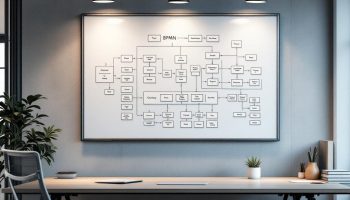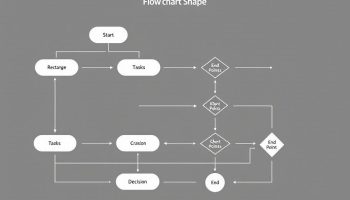
Transforming Businesses Through Lean Accreditation
Lean accreditation transforms businesses by enhancing operational efficiency through process improvement and waste reduction. This structured approach equips professionals with methodologies and tools to optimize performance in manufacturing, healthcare, technology, and beyond.
Key Takeaways
- Lean accreditation focuses on core principles of process improvement, waste elimination, and operational excellence.
- The certification framework offers progressive skill development through belt-level systems.
- Professionals with lean credentials can experience significant salary increases and career advancement opportunities.
- Technological advancements are reshaping lean accreditation, incorporating AI and digital learning platforms.
- Lean methodologies are adaptable across multiple sectors, making the accreditation broadly applicable.
Certified lean practitioners develop specialized skills to identify inefficiencies and implement solutions that streamline operations. You’ll gain practical knowledge in value stream mapping, kaizen events, and continuous improvement techniques that deliver measurable results. These competencies allow you to reduce costs while improving quality outcomes.
The structured progression of lean certification—from Yellow to Black Belt—creates a clear development path. Each level builds on previous knowledge, allowing you to tackle increasingly complex challenges. Organizations value this systematic approach because it creates consistency in problem-solving methods across departments.
Earning lean credentials directly impacts your earning potential. Statistics show certified professionals command salaries 15-20% higher than non-certified counterparts. This certification also opens doors to leadership roles, as companies prioritize candidates who demonstrate mastery of efficiency principles and change management.
Digital transformation has modernized lean accreditation programs. Online learning platforms now offer interactive simulations and real-time feedback. These innovations make certification more accessible while maintaining rigorous standards. The integration of data analytics enhances your ability to measure and demonstrate improvement results.
The versatility of lean methodology extends its value across industries. Healthcare organizations apply these principles to improve patient care and reduce costs. Technology companies leverage lean practices to accelerate product development cycles. Service-oriented businesses use these approaches to enhance customer experiences and streamline operations.
Lean accreditation provides a structured framework for professional growth while delivering tangible benefits to organizations. Your investment in this certification creates immediate value through practical applications and long-term career advancement opportunities.
“Lean accreditation stands as a pivotal catalyst for businesses striving for operational excellence, empowering professionals with the structured tools and methodologies needed to drive process improvement and waste reduction. As industries evolve with technological advancements, embracing lean principles not only enhances performance but also unlocks significant career growth and salary potential for those equipped with these vital credentials.”
Understanding Lean Methodology
Lean accreditation has evolved from its origins in manufacturing to become a cornerstone of business efficiency across industries. You’ll find lean methodology focuses on three fundamental principles: process improvement, waste reduction, and operational excellence. These principles form the backbone of any lean accreditation program, helping organizations streamline operations and maximize value.
Lean Six Sigma represents a strategic approach that combines waste elimination techniques with rigorous quality improvement methods. This powerful methodology has gained tremendous traction in the corporate world, with 82% of Fortune 100 companies implementing Six Sigma methodologies by 2025. Pursuing lean accreditation equips you with these in-demand skills that organizations increasingly value.
Core Principles That Drive Results
The essence of lean accreditation centers on mastering several key concepts that transform business operations:
- Value identification – Determining what customers truly value and are willing to pay for
- Value stream mapping – Analyzing and optimizing the flow of materials and information
- Continuous flow – Creating smooth processes without bottlenecks or delays
- Pull systems – Producing only what is needed when it’s needed
- Continuous improvement – Constantly seeking perfection through ongoing refinement
These principles form the foundation of lean accreditation programs and guide your approach to continuous improvement initiatives. When applied correctly, they help eliminate the eight common types of waste: defects, overproduction, waiting, non-utilized talent, transportation, inventory, motion, and excess processing.
Implementing lean methodologies requires strong project leadership skills and a systematic approach to problem-solving. The DMAIC framework (Define, Measure, Analyze, Improve, Control) provides a structured method for tackling complex challenges and achieving measurable results through lean accreditation.
The versatility of lean accreditation makes it applicable across diverse sectors. While manufacturing was its original home, you’ll now find lean principles transforming healthcare delivery, financial services, information technology, and government operations. This adaptability explains why lean accreditation has become increasingly valuable for professionals seeking to enhance their career prospects and drive organizational excellence.
By obtaining lean accreditation, you gain both theoretical knowledge and practical tools to identify inefficiencies, implement solutions, and maintain improvements. This combination of skills makes lean-certified professionals highly sought after in today’s efficiency-focused business environment.

Certification Levels: Your Professional Roadmap
The lean accreditation framework offers a structured pathway to professional excellence through its belt-level certification system. You’ll find this comprehensive structure enables progressive skill development while increasing your value to organizations implementing lean methodologies.
Understanding the Belt System
Lean accreditation follows a tiered approach that builds expertise systematically:
- White Belt: Your entry point to lean accreditation, providing foundational knowledge of basic concepts and terminology. This certification enables you to participate in organizational improvement initiatives and understand the value of lean thinking.
- Yellow Belt: This level deepens your understanding of core lean tools while preparing you to support process improvement projects. Yellow Belt lean accreditation equips you with problem-solving techniques and data collection methods.
- Green Belt: At this stage, your lean accreditation qualifies you to lead smaller improvement projects and effectively implement change. You’ll master statistical analysis tools and develop project leadership capabilities essential for process optimization.
- Black Belt: This advanced lean accreditation positions you as an expert capable of managing complex, enterprise-wide initiatives. You’ll gain comprehensive knowledge of all lean methodologies and develop the ability to mentor others while driving significant organizational transformation.
- Master Black Belt: The pinnacle of lean accreditation, this level transforms you into a strategic leader who can implement lean philosophy across entire organizations. You’ll develop expertise in training Black Belts and creating a sustainable lean culture.
Each certification level in the lean accreditation journey requires different commitments of time and resources. The following table outlines the typical requirements at each stage:
| Certification Level | Training Hours | Project Requirements | Organizational Impact |
|---|---|---|---|
| White Belt | 8-16 hours | None | Basic awareness |
| Yellow Belt | 20-30 hours | Team participation | Localized improvements |
| Green Belt | 80-100 hours | 1-2 projects | Departmental changes |
| Black Belt | 140-160 hours | 2+ projects with financial results | Cross-functional transformation |
| Master Black Belt | 220+ hours | Multiple projects and mentoring | Enterprise-wide strategic impact |
Your lean accreditation journey requires careful consideration of your current role, career aspirations, and organizational needs. Many professionals start with Yellow or Green Belt certification to build momentum before pursuing higher levels. The structured nature of lean accreditation ensures you can progressively build skills while demonstrating tangible value to your organization.
When planning your certification path, consider how each level of lean accreditation aligns with your professional development goals. The skills gained through lean accreditation—from analytical thinking to change management—provide transferable value across industries and functions.

Career Advancement Through Lean Certification
Your professional journey can accelerate significantly with lean accreditation under your belt. Certified lean professionals enjoy substantially higher earning potential across various roles. Management consultants with lean accreditation earn an average of $101,451, while operations managers command salaries around $85,059. Process engineers and quality assurance engineers with lean credentials average $77,689 and $76,022 respectively. For mid-career professionals, lean accreditation can boost earnings by up to 29.7%.
Leveraging Lean Credentials for Professional Growth
Lean accreditation provides more than just financial benefits—it opens doors to career mobility and advancement opportunities. The structured progression of lean certifications creates a clear professional roadmap for your career development. When you pursue lean accreditation, you demonstrate commitment to continuous improvement principles that organizations value highly.
Here are the key ways lean accreditation enhances your career prospects:
- Increased visibility for promotion opportunities
- Enhanced credibility when leading improvement initiatives
- Greater cross-industry transferability of skills
- Stronger positioning for leadership roles
- Expanded professional network through certification communities
The value of lean accreditation extends across industries. Manufacturing, healthcare, IT, finance, and logistics sectors actively seek professionals with these credentials. Your project leadership capabilities become more recognized when backed by formal lean certification.
Selecting the right certification level based on your career goals is crucial for maximizing return on investment. When evaluating lean accreditation options, consider your current role, desired career path, and organizational needs. Many professionals begin with Yellow or Green Belt certification before progressing to more advanced levels.
Maintaining your lean accreditation requires continuous improvement of your own skills. Staying current with evolving methodologies ensures your lean expertise remains relevant in an ever-changing business landscape. This commitment to ongoing learning aligns perfectly with the lean philosophy itself.
The implementation of lean principles through proper accreditation helps organizations achieve remarkable efficiency gains. By applying lean methodologies, you’ll contribute to waste reduction initiatives that directly impact bottom-line results. Your ability to lead these efforts becomes a valuable asset that distinguishes you from peers without lean accreditation.
Professionals with lean certification can see average salary increases of up to 29.7% as they advance in their careers, demonstrating the strong financial impact of continuous improvement expertise.
forbes.com
Technology and Future of Lean Accreditation
The landscape of lean accreditation is rapidly evolving with technological advancements reshaping how professionals obtain and apply their certifications. You’ll find that lean accreditation now incorporates cutting-edge technologies that enhance both the learning process and practical application of lean methodologies.
AI and machine learning have revolutionized lean accreditation by enabling predictive analytics for process improvement. These technologies help you identify patterns and potential issues before they impact performance, making lean accreditation more valuable than ever. IoT sensors provide real-time data collection, allowing for immediate adjustments rather than waiting for traditional measurement cycles. This integration makes lean accreditation increasingly relevant in digitally-transformed workplaces.
Digital DMAIC (Define, Measure, Analyze, Improve, Control) platforms have transformed how lean accreditation is applied in practice. These tools streamline the improvement process and make lean accreditation more accessible to teams across different locations. As noted in Six Sigma black belt projects, digital tools have become essential components of successful lean implementation.
Evolving Learning Approaches in Lean Accreditation
The educational approach to lean accreditation has shifted significantly toward practical, project-based learning. This transition reflects the understanding that lean accreditation delivers more value when concepts are immediately applied to real business challenges. You’ll now find certification programs emphasizing hands-on experience over theoretical knowledge alone.
Remote and flexible certification formats have expanded access to lean accreditation globally. These formats include:
- On-demand video instruction with interactive components
- Virtual simulation environments for practicing lean techniques
- Remote coaching and mentorship opportunities
- Hybrid learning models combining self-paced and instructor-led elements
These advancements have made lean accreditation more accessible while maintaining rigorous standards. The continuous improvement philosophy that underpins lean methodology has been applied to the accreditation process itself.
The future of lean accreditation also emphasizes cross-functional integration. Modern programs train professionals to apply lean principles across departments rather than in isolation. This holistic approach makes lean accreditation particularly valuable for organizations undergoing digital transformation or implementing project delivery frameworks.
As lean accreditation continues to evolve, certifications increasingly focus on industry-specific applications. Healthcare lean accreditation, for example, addresses unique challenges in patient care workflows, while IT-focused programs target software development and digital service delivery. This specialization ensures your lean accreditation delivers maximum value in your particular field.
70% of organizations believe that adopting lean methodologies and digital tools will give them a competitive edge in the next five years.
forbes.com
Leading Certification Organizations
Several prestigious institutions provide lean accreditation to professionals seeking to enhance their process improvement skills. The Council for Six Sigma Certification (CSSC) stands out as a globally recognized authority offering comprehensive lean accreditation programs that adhere to rigorous industry standards. Their certification process involves thorough examination of candidates’ understanding of lean methodologies and practical application capabilities.
The International Association for Six Sigma Certification (IASSC) delivers another well-respected pathway to lean accreditation through standardized testing protocols. Their approach emphasizes theoretical knowledge and practical implementation skills, ensuring certified professionals can effectively drive waste reduction initiatives. IASSC certifications are particularly valued for their vendor-neutral stance, focusing purely on methodology rather than specific organizational approaches.
Specialized Certification Options
MindCypress provides specialized lean accreditation programs with flexible learning formats to accommodate working professionals. Their certifications incorporate continuous improvement principles while focusing on practical application scenarios. You’ll find their approach particularly beneficial if you’re seeking a blend of theoretical foundation and hands-on implementation techniques.
Purdue University’s Lean Six Sigma programs offer academically rigorous lean accreditation options with strong industrial connections. Their certification programs integrate academic excellence with practical business applications, making them ideal for professionals seeking both educational credibility and workplace relevance. When pursuing lean accreditation through university-affiliated programs, you’ll benefit from current research-based approaches to process optimization.
Choosing the right certification provider depends on your specific career goals and industry requirements. Each organization brings unique strengths to lean accreditation, from CSSC’s comprehensive approach to IASSC’s vendor-neutral stance. Before committing to a certification path, consider how each program’s lean accreditation requirements align with your professional development needs and project leadership aspirations.
The lean accreditation landscape continues evolving to meet industry demands, with providers increasingly incorporating digital delivery methods and project-based assessments. This evolution ensures lean accreditation remains relevant in addressing contemporary business challenges while maintaining the core principles of waste elimination and process excellence.
Implementing Your Lean Certification Strategy
You’ll need a clear plan to maximize the value of your lean accreditation journey. Selecting the right certification level isn’t just about getting a credential—it’s about aligning your professional development with your career aspirations and organizational needs.
When choosing your lean accreditation path, assess your current role and future goals. White and Yellow Belt certifications provide foundational knowledge for team members supporting improvement initiatives, while Green Belt certification equips you with the skills to lead process optimization projects. For those aiming to drive enterprise-wide transformation, Black Belt and Master Black Belt certifications offer comprehensive training in advanced lean methodologies.
Strategic Implementation Approaches
Your lean accreditation strategy should include these key elements:
- Alignment with organizational objectives to ensure your certification brings immediate value
- Selection of accreditation bodies based on industry recognition and curriculum relevance
- Balancing theoretical knowledge with practical application through real-world projects
- Establishing a continuous learning plan to maintain and expand your lean expertise
- Creating a professional development roadmap that integrates lean accreditation with other skills
Continuous learning remains essential after achieving lean accreditation. You can maintain your certification’s relevance through continuous improvement practices, participating in industry forums, and engaging with lean accreditation communities.
The application of lean methodologies extends across diverse sectors. Manufacturing professionals leverage lean accreditation to streamline production, while healthcare organizations use these principles to enhance patient care. Financial institutions implement lean practices to optimize transaction processing, and IT departments apply lean accreditation concepts to software development cycles.
Your implementation strategy should include identifying key stakeholders who can support your lean initiatives. By demonstrating how lean accreditation connects to business outcomes, you’ll gain the organizational buy-in needed for successful implementation.
Remember that lean accreditation isn’t just about certification—it’s a transformative approach that requires commitment to ongoing skill development. With proper implementation, your lean accreditation can drive significant improvements in efficiency, quality, and organizational performance.






